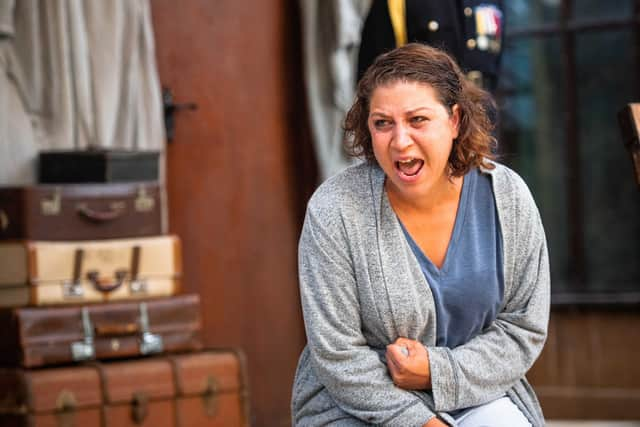Theatre review: The Winter’s Tale, Botanic Gardens, Glasgow


The Winter’s Tale, Botanic Gardens, Glasgow *****
William Shakespeare was never one to propose structural changes in the rules that governed politics and society. In an age of kings and nobles wielding huge arbitrary power over the lives of others, and of unquestioned patriarchal power in the family, his only resort in the face of injustice was to pen mighty pleas that those holding power should use it less brutally, and more wisely.
Yet for all that, he saw and described the human consequences of the abuse of power with a clarity that sears the soul, and often seems radical in itself; and nowhere more so than in The Winter’s Tale, the beautiful and sometimes terrifying late romance in which he tells the story of a King, Leontes, who seems to have everything – peace in his country, a wise and beautiful wife, a fine young son, another child on the way, and a life-long friend in Polixenes, king of nearby Bohemia – when he is suddenly seized by a jealous madness that makes him believe his wife is a slut, Polixenes is the man who has betrayed him, and the coming child is not his own.
Advertisement
Hide Ad

The tragedy of his descent into this frenzy is horrifying. Within days, Leontes has imprisoned and publicly destroyed his wife, made an enemy of Polixenes, sent his newborn daughter to death by exposure, and caused the death from grief of his young son – the blow that finally ends his madness, and which begins his long repentance, supervised, until its strange and wondrous conclusion, by Hermione’s furious senior waiting-woman, Paulina.
The Winter’s Tale is one of Shakespeare’s most mysterious and complex plays, a kind of wishful dream of redemption full of wild coincidences and strangely gripping drama; and it’s a measure of the huge skill and experience Gordon Barr’s Bard In The Botanics company now bring to their work that in just 105 short minutes, without an interval, they capture the very essence of the play.
Nicole Cooper is a magnificent Hermione, drawing a superb and timely portrait of female dignity ravaged but unbowed by rank male cruelty and injustice. Adam Donaldson is an impressive Leontes, first maddened then grief-stricken; Jennifer Dick and Alan Steele are equally eloquent and sure-footed as Paulina and her courtier husband Antigonus.
And as ever, Gordon Barr and his company contrive to make a huge virtue of the limitations within which they work. The brevity of this version of the play makes for a concentrated and compelling version of the central story. The fact that there are only six actors generates strokes of genius like having both of Leontes’s children – the ill-fated boy prince, and the long-lost daughter Perdita – played by the same actor, the infinitely versatile Stephanie McGregor.
And the fact that this two-play Bard season was rehearsed under strict safety conditions, with the actors almost never less than a metre apart, adds a perfect note of yearning and irresolution to this exquisite yet uneasy play; above all in its powerful final tableau, when Leontes reaches for the hand of his mysteriously restored wife, only to find her transfixed by the portrait of the couple with their lost son that dominates the stage. Will she reach for Leontes, or remain frozen in grief and fury? The play does not fully tell us; and neither does this deeply moving production, which shows the Bard company at the height of its powers, and deserves the widest possible audience, in the rest of its run.
Botanic Gardens, Glasgow, Until 28 August
A message from the Editor:
Thank you for reading this article. We're more reliant on your support than ever as the shift in consumer habits brought about by coronavirus impacts our advertisers.
If you haven't already, please consider supporting our trusted, fact-checked journalism by taking out a digital subscription at https://www.scotsman.com/subscriptions